The Ultimate Guide to Data Driven Procurement


Data plays a crucial role in decision-making. Relying merely on intuition and experience is no longer sufficient for procurement leaders to be at the top of their game.
To truly benefit their organizations and stakeholders, they must harness the wealth of available data for informed decision-making, cost savings, and stronger supplier relationships.
Like many other business roles, the procurement function is going through a transformation, influenced largely by technology and process changes it brings.
And data driven procurement is more than just a buzzword—it’s a revolutionary shift that reshapes the ways procurement professionals operate.
So, in this article, we’ll delve into data driven procurement as a whole. We’ll explore the advantages of embracing such an approach and share some practical tips for doing it effectively.
Data driven procurement is all about intelligent decision-making fueled by data and analytics.
This approach encompasses gathering and crunching data from different sources to spot trends and gain valuable insights.
At its core, data driven procurement relies on collecting, analyzing, and interpreting various types of data to make informed, fact-based decisions when selecting and managing suppliers.
With a data driven mindset, procurement leaders get a clear view of their spending habits, supplier performance, and market dynamics.
Armed with this knowledge, they can make strategic moves that drive efficiency, cost savings, and overall effectiveness in the procurement function.
It’s like having a superpower to make sharper decisions that amplify an organization’s value.
In sum, the types of data involved in data driven procurement include:
| Transactional data | Purchase orders, invoices, and receipts provide insights into procurement transactions |
| Supplier data | Information about supplier performance, financial stability, and history |
| Market data | External data sources that include market prices, economic indicators, and industry trends |
| Demand data | Historical demand patterns, sales forecasts, and customer orders |
| Inventory data | Information on inventory levels, turnover rates, and carrying costs |
| Cost data | Data related to the cost of goods, transportation, and other related expenses |
In a nutshell, data driven procurement is the secret ingredient that helps organizations make savvy choices, save money, and create real value.
It becomes clearer by the minute that automation is a game-changer, significantly reducing both the time and resources required to complete a task by processing data much faster than humans.
Considering the volume of data companies work with in today’s global economy, relying on automated systems to find the signal in the noise is inevitable. In short, automation is a key player in data driven procurement.
By harnessing technologies like artificial intelligence (AI) and machine learning (ML), procurement leaders can streamline routine procurement tasks and access the right information at the right time.
AI works in real time to aggregate and contextualize vast amounts of data, giving companies a better oversight of supply chain reliability, costs, risks, trends, and more.
This cuts down on manual work, enhances data precision, slashes errors, and speeds up the procurement process.
Keith Hartley, CEO of LevaData, emphasizes that companies must reinvent workflows, replacing manual processes with AI platforms to survive in this data driven era.
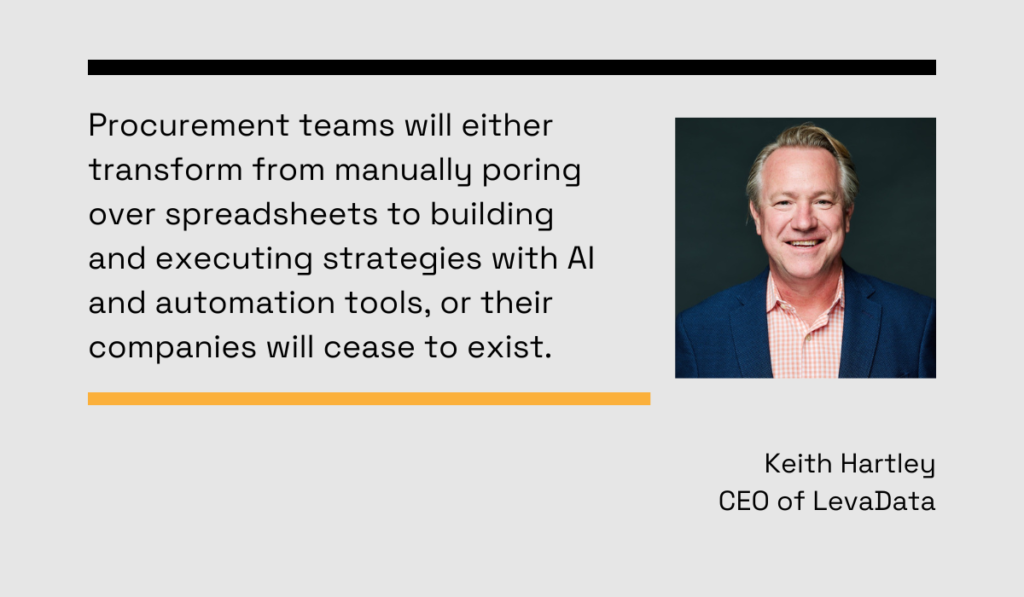
Illustration: Veridion / Quote: Future of Sourcing
Hartley adds that these technologies won’t replace people in supply chain and procurement roles.
Instead, AI and automation will take care of the tedious, time-consuming tasks that teams don’t enjoy doing, while helping procurement professionals become more important in creating and driving strategy for the organization.
Thanks to real-time data analytics, procurement specialists can quickly identify top-performing suppliers, negotiate better prices, and lower their procurement costs.
This transforms procurement into a strategic function that substantially impacts companies’ bottom line and competitiveness.
Focusing on building a flexible and connected digital infrastructure supported by up-to-date and accurate data is vital to success.
It sets the stage for gaining a competitive edge, boosting profitability, and fostering innovation in the years to come.
Data driven procurement leads the procurement process on a transformative journey, offering numerous benefits to companies embracing new technologies.
By adopting data driven procurement and advanced analytics, organizations can enhance their procurement strategies, cut costs, manage risks, and drive greater value from their supplier relationships.

Source: Veridion
Let’s explore further a few ways data driven procurement can optimize your organization’s operations.
Data driven procurement has emerged as a powerful tool, equipping procurement specialists with the insights needed to make informed strategic decisions.
For instance, as a procurement executive, you’re tasked with performing spend analysis, recognizing trends, evaluating how well suppliers are doing, looking at potential risks, and doing market research.
Utilizing advanced analytics methods—like predictive modeling and machine learning—can help you accomplish this in the blink of an eye.
Furthermore, it will uncover hidden insights and patterns that might not be obvious at first glance.
In other words, by tapping into big data analytics, you can navigate the complex world of procurement with greater precision and effectiveness.
One of the key advantages of data driven procurement for decision-making is its ability to provide a real-time view of market dynamics.
With access to comprehensive market data, you can stay ahead of industry trends and adjust rapidly to changing conditions.
This valuable information empowers organizations to be flexible and not lag behind.
Moreover, data driven procurement isn’t limited to reactive decision-making. It also enables proactive strategies that drive organizational growth.
By identifying emerging opportunities and potential risks, you can align your procurement efforts with the broader business objectives, ensuring that every procurement decision contributes to the company’s success.
Cost reduction is the number one strategic priority of procurement departments, and collecting and analyzing procurement data helps you identify cost-saving opportunities.
This may involve consolidating suppliers, optimizing inventory levels, negotiating better pricing and terms, and implementing strategic sourcing.
Leveraging insights from data analysis enables procurement professionals to achieve cost savings while upholding quality standards.
Data driven procurement strategy goes beyond tracking expenses however; it also reveals how spending habits impact your business.
The growing investment in data-related technologies emphasizes the significance of data driven procurement in spend management.
By scrutinizing procurement data, you can spot inefficiencies, renegotiate contracts, and even predict future spending trends, resulting in substantial cost savings.
Unlocking the cost-saving benefits of data driven procurement involves several key steps:
| Historical spend analysis | Dive into past procurement data to detect spending patterns. This retrospective view may uncover recurring overspending in specific categories or with particular suppliers. |
| Future spend forecasting | Employ predictive analytics to anticipate future spending trends. Understanding what lies ahead helps with preparation, budgeting, and negotiations. |
| Automated cost analysis | Get on board with technology offering real-time cost analysis, quickly highlighting discrepancies and potential savings. |
These steps empower organizations to keep their spend in check and reduce overall costs.
Traditional transactional relationships with suppliers are becoming a thing of the past.
Data driven sourcing insights provide a higher level of transparency when evaluating supplier performance, where collaboration is the cornerstone of success.
In this scenario, understanding a supplier’s strengths and weaknesses allows procurement specialists to engage in productive performance-based dialogues.
Armed with accurate data, you can shift from providing generic feedback to having specific, data driven discussions with your suppliers.
You can highlight their areas of excellence and explore potential areas for improvement.
These interactions will empower your suppliers to achieve continual progress in terms of quality, efficiency, and timeliness.
After all, your suppliers’ success is intricately linked to your own. So it’s worth investing time and effort to understand your supplier network more in-depth.
Furthermore, data driven procurement opens the door to collaborative growth.
When you make sure to exchange information and insights, it’s easier to align strategies, so that both parties can grow and innovate to mutual benefit.
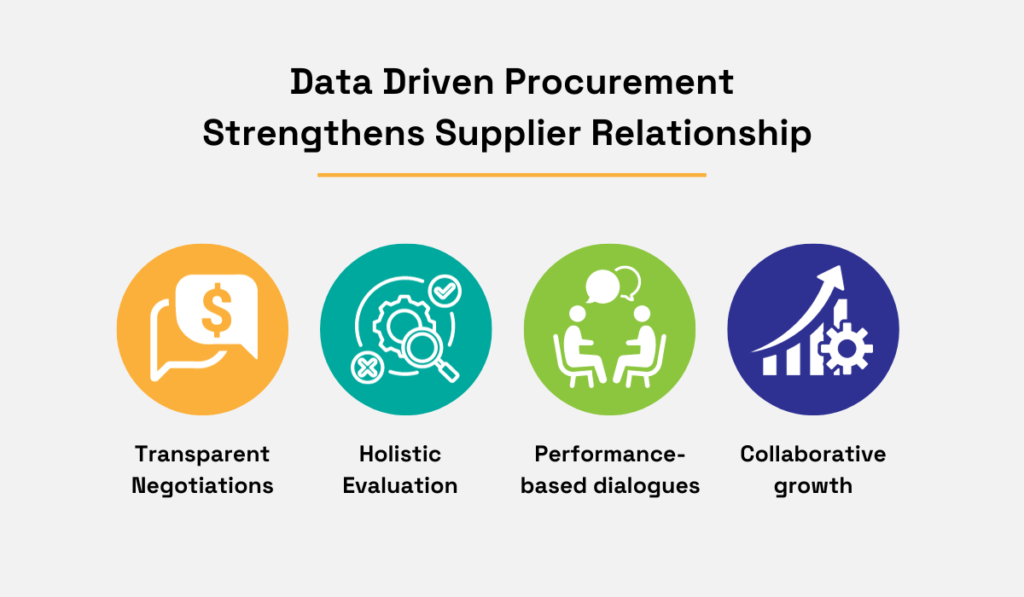
Source: Veridion
That means you can engage your key suppliers in joint business planning sessions.
However, for that to happen, it’s important to be transparent when negotiating, as you’ll probably need to negotiate terms regarding your future joint activities.
When entering the negotiating process, you need to have a clear understanding of what each party brings to the table, and for that, again, you need data-backed insights.
As you can see, data enables transparency, and transparency lays the foundation for trust and more favorable terms for both sides.
But there are many other data points that impact the relationship with your suppliers.
There are factors like sustainable practices, quality, ethics, financial stability, and strategic alignment.

Source: Veridion
When your procurement processes are data driven, you can access this data, and you can evaluate your suppliers considering all the factors.
For example, if you would use our supplier sourcing enablement tool, Veridion, you’d be able to access fresh information about millions of suppliers worldwide in seconds.
Whether you’re looking for basic company data, product information, technographics, or insurance classifications, we have it all.
These are just a few of the ESG insights you’d be able to access:
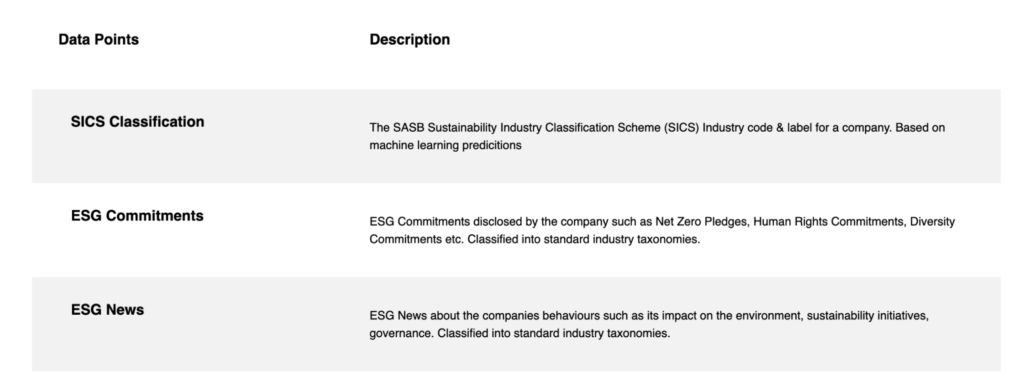
Source: Veridion
That way, you achieve a holistic supplier evaluation approach.
Such comprehensive assessment ensures you’re not just focusing on the profits but on the long-term sustainability of your supplier relationships.
In essence, by analyzing performance data and extracting actionable insights, you can fortify your supplier relationships, building mutual trust and fostering innovation.
To unlock the true potential of data and make the procurement processes more efficient and aligned with strategic goals, organizations need to implement several vital elements.
Developing a data strategy, investing in robust procurement technology, and fostering data driven work culture will solidify the implementation of data driven procurement.
In a data-rich business setting, having a data strategy isn’t just a good idea—it’s a necessity.
Procurement teams, in particular, are in a prime position to champion data strategies. They possess a wealth of valuable data, from spending patterns and supplier relationships to risk mitigation.
At its core, a data strategy paints a vivid picture of an organization’s future in terms of data collection, storage, sharing, and utilization.
It serves as a long-term roadmap, defining the technology, processes, people, and rules essential for managing an organization’s valuable information assets.
Data strategy means selecting the sources for data, knowing how to analyze the data, and what is most important to track.
So, why invest in a data strategy? Here are some compelling reasons:

Source: Veridion
A well-crafted data strategy doesn’t just give you a competitive edge; it also aligns data management with your business strategy and governance.
Strategizing makes you ask the tough questions and make the best of the available data. Remember, data needs to be in the function of the overall business strategy, not exist in isolation.
Furthermore, developing a data strategy fosters a data driven culture (which we’ll get to a bit later), transforming mindsets and practices within the organization.
It outlines new responsibilities, required skill sets, and capabilities to execute the strategy effectively.
Overall, for effective data driven procurement, a comprehensive data strategy is essential, ensuring competitive advantage and aligning data management with core business objectives.
To effectively harness the power of data driven procurement, organizations must invest in the right technology tools.
These tools encompass a spectrum of solutions, from data analytics software to spend analysis tools and supplier performance management systems.
Modern procurement demands modern tools, and this is where platforms with robust analytics capabilities come into play.
When considering an investment in new technology, look for an analytics platform that has the ability to sift through vast amounts of data, pinpoint patterns, and provide actionable insights.
The transformation of raw data into strategic recommendations is nothing short of a game-changer.
Among these innovative platforms is Veridion’s AI-powered procurement solution.
Veridion offers businesses a comprehensive, up-to-date supplier database that is regularly refreshed, addressing one of the major challenges in data driven procurement – outdated information.
With Veridion, your data is always fresh and accurate.
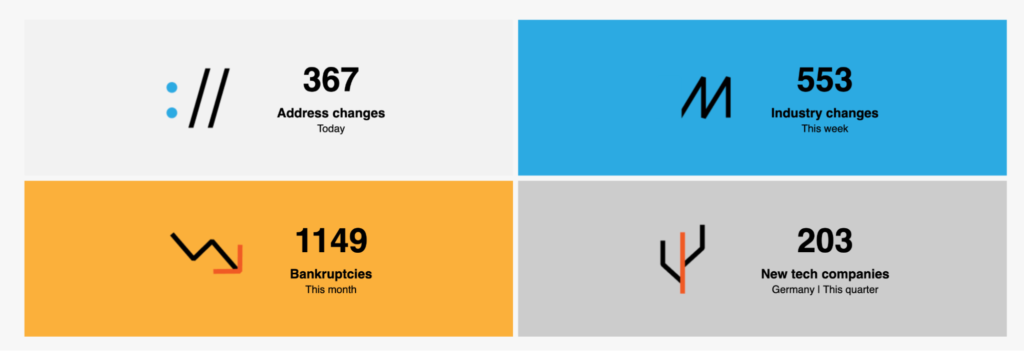
Source: Veridion
With access to the most up-to-date and accurate supplier data, you can quickly identify potential risks and monitor shifts in a supplier’s business activity.
On top of that, granular control, custom-made risk factors, and real-time alerts empower you to manage supplier risks effectively and safeguard your business from potential disruptions.
In times when data is king, cutting-edge technology and data solutions empower procurement to thrive, driving efficiency, reducing risks, and unlocking the full potential of data driven procurement.
The foundation of success in data driven procurement lies in creating a culture where employees are not only comfortable with tools, data, and analytics but also enthusiastic about leveraging them.
This culture is nurtured through training and the provision of necessary resources.
When employees understand the value of data and are equipped with the skills to use it effectively, the procurement process undergoes a transformation—it becomes more agile, more efficient, and more aligned with organizational goals.
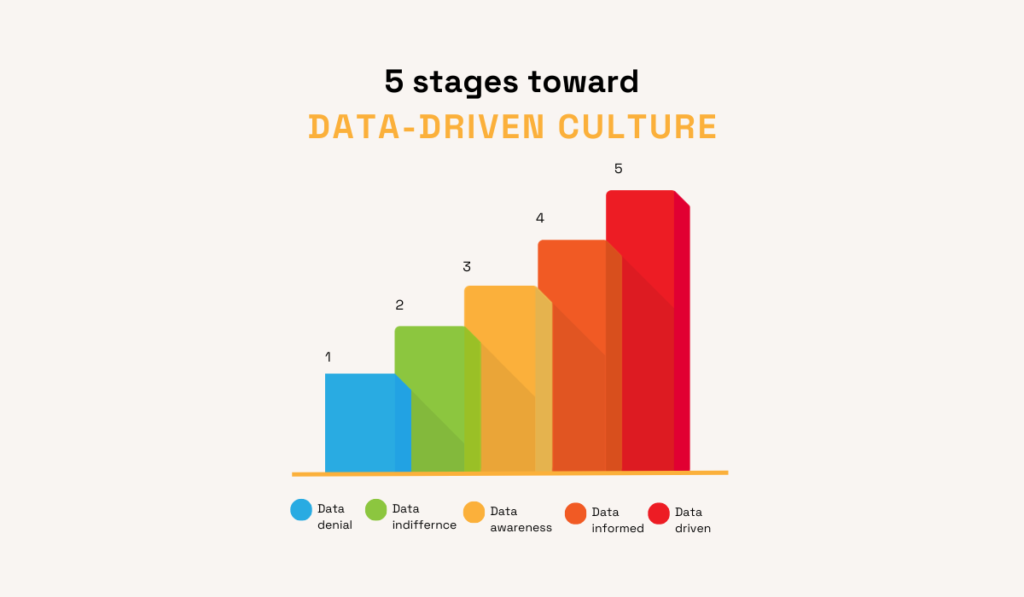
Source: Veridion
Investing in education and ongoing training empowers your team to use the full potential of these platforms, yielding substantial returns on your data driven initiatives.
On top of that, it’s essential to establish processes for data sharing, ensuring that all employees have access to the data needed for decision-making.
Make sure everyone has access to the same data, so there won’t be information silos.
Encouraging cross-functional collaboration between procurement teams and other departments, such as finance or operations, is equally valuable.
Sharing insights and knowledge across functions provides a more comprehensive view of the organization’s needs, leading to more informed decisions.
In short, a data driven culture is the bedrock of successful data driven procurement.
As businesses continue to evolve, data driven procurement will remain a vital tool in staying competitive and agile in a rapidly changing marketplace.
Data driven procurement leverages data and analytics to make informed decisions, optimize supplier relationships, and enhance procurement processes.
By investing in AI-powered technology, developing a data strategy, and fostering a data driven culture among employees, organizations can optimize profits and uncover hidden cost savings opportunities.
This strategic approach not only drives efficiency but also enhances supplier performance and overall competitiveness.
Embracing data driven procurement is not just a trend but a fundamental element of success in today’s dynamic business setting.